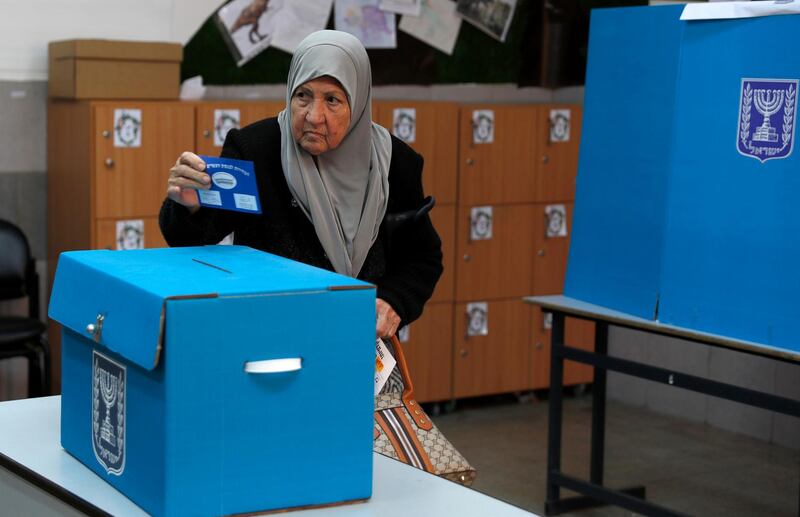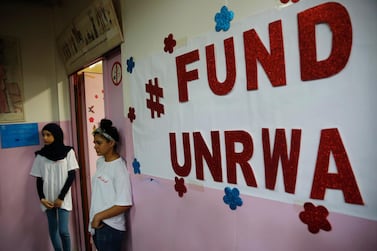Israel’s ruling party is increasing its tactics to suppress Arab voters before the September election, Israeli civil rights groups say.
Israeli Prime Minister Benjamin Netanyahu’s Likud party is doubling its budget for surveillance, such as hidden cameras, to be used on polling stations and voters in Arab communities.
Israel’s election committee will consider a petition on Thursday calling for the practice to be banned as discrimination.
Arab and Palestinian citizens of Israel make up more than 20 per cent of Israel’s nine million citizens, but have historically played a marginal role in Israel’s coalition style government.
In this election, however, the embattled prime minister is taking no prisoners as he fights for his political life.
Mr Netanyahu won the last election in April but sent the country back to the voting booths after he failed to form a government in a standoff with his former ally, now arch-rival Avigdor Lieberman.
Now Likud and its far-right competitors are desperately trying to secure as many votes as possible, demonising and discouraging Arab voters as part of their strategy, said Sawsan Zaher, a lawyer with Palestinian legal centre Adalah.
“If they succeed in having fewer Arabs voting, the representatives of Arabs in the Knesset will be fewer,” Ms Zaher said.
“The same mandates will be given to Jewish Israeli parties at the expense of the Arab ones.”
Mr Lieberman first raised the level of hate speech against Arab and Palestinian citizens of Israel in the 2009 election.
“No loyalty, no citizenship,” one of his campaign slogans read, referring to his demand that Arab citizens take a loyalty test.
In the 2015 election, Mr Netanyahu called on Jewish Israeli voters to head to the voting booths on election day to combat the “droves of Arabs” voting.
But Israeli Arabs and Palestinians are less likely than Jewish Israelis to vote.
They did turn out in record numbers, 62 per cent, in the 2015 election and Arab parties became the Parliament’s third largest bloc.
In April’s election, only 49 per cent voted amid the racist campaigning, fighting between Arab parties and growing calls to boycott out of frustration with the system.
On the last election day, Likud armed 1,200 polling committee representatives with hidden cameras and stationed them in polling places in mainly Arab communities.
Likud said it was necessary to prevent voter fraud, which has never been a major issue in Israeli elections. Critics said it was a front for scaring off Arab voters.
There was confusion in some polling stations when news broke of the hidden cameras. The day after the election a public relations firm led by a settler leader boasted on Facebook that it was behind Likud’s strategy.
"Thanks to us placing observers in every polling station, we managed to lower the voter turnout to under 50 per cent, the lowest in recent years," Kaizler Inbar wrote.
This year, Likud is budgeting $570,000 (Dh2.09m) for the operation and is asking for police reinforcements to protect their poll watchers, Israeli media said.
Adalah is leading the campaign for the Election Committee to ban the cameras on the basis that Likud “racially profiled Arab voters in Arab towns, tagging them as those who will be cheating", Ms Zaher said.
Israel’s Attorney General, Avichai Mandelblit, is expected to express his opposition to Likud’s plan in the committee hearing.
But activists worry about the effect if the cameras are given approval.
In another case seen as a possible flashpoint, activists are preparing to bus in Bedouin citizens from villages in the south to the voting booths, because the state has repeatedly refused to do so.
About 30 per cent of Israel’s 260,000 Bedouin citizens live in 35 villages that the government does not recognise.
These villages are cut off from roads, electricity, public transport and other state services, including voting booths. Residents need to travel up to 50 kilometres to vote in other areas.
In April, Zazim, an Israeli charity pushing for social change, raised funds for buses to take more than 4,000 Bedouin citizens to vote.
That was despite an Israeli ultra-nationalist group, Im Tirzu, which is backed by Likud, unsuccessfully appealing to the central elections committee to block the initiative.
This time, Zazim is organising a bus network to take 15,000 Bedouin voters to the polls, said Eli Philip, its campaign manager.
“Ideally, we don't want to be doing this,” Mr Philip said. “Israeli citizens shouldn’t be paying for buses for other Israeli citizens to vote.
"It’s the job of the state. There are all sorts of things the state does to make voting easier. When it comes to Bedouin citizens in the Negev, the state isn't doing this."
Zazim and Adalah have repeatedly and unsuccessfully petitioned the government to extend voting booths or transport to these communities.
With the election in just over a month, Ms Zaher said they were bracing for more.
"You never know what will happen this week or next week before the election," she said.






